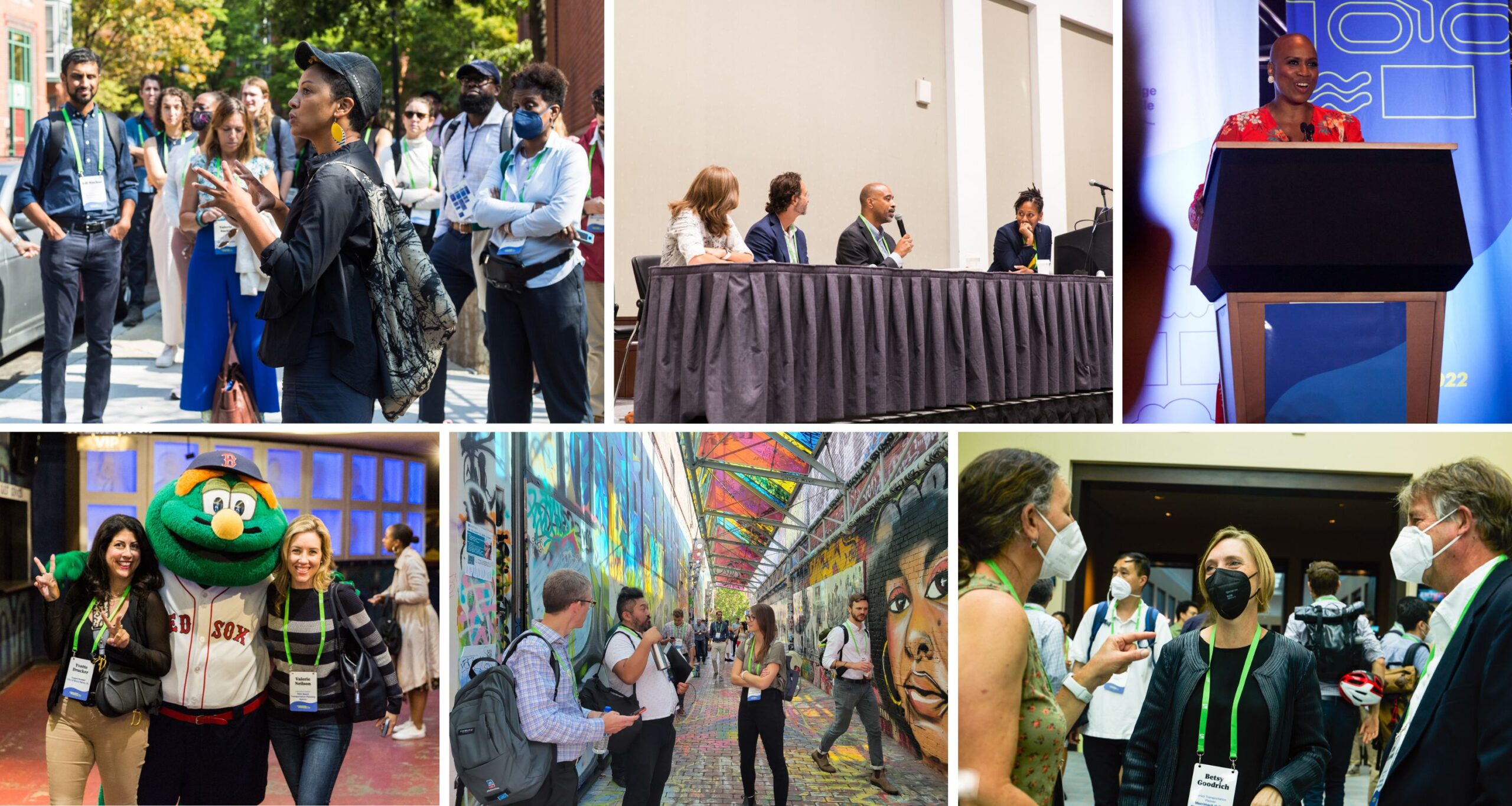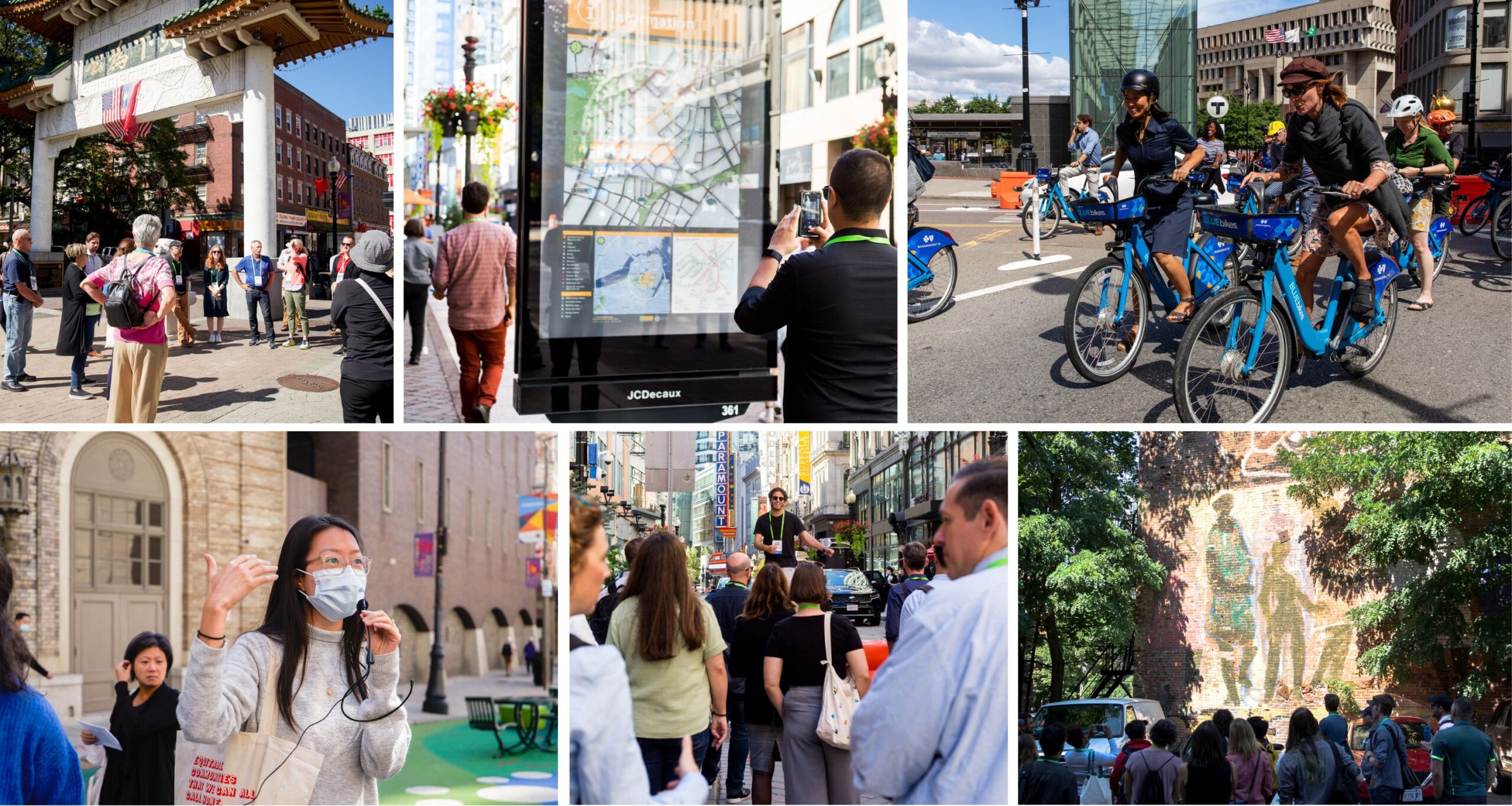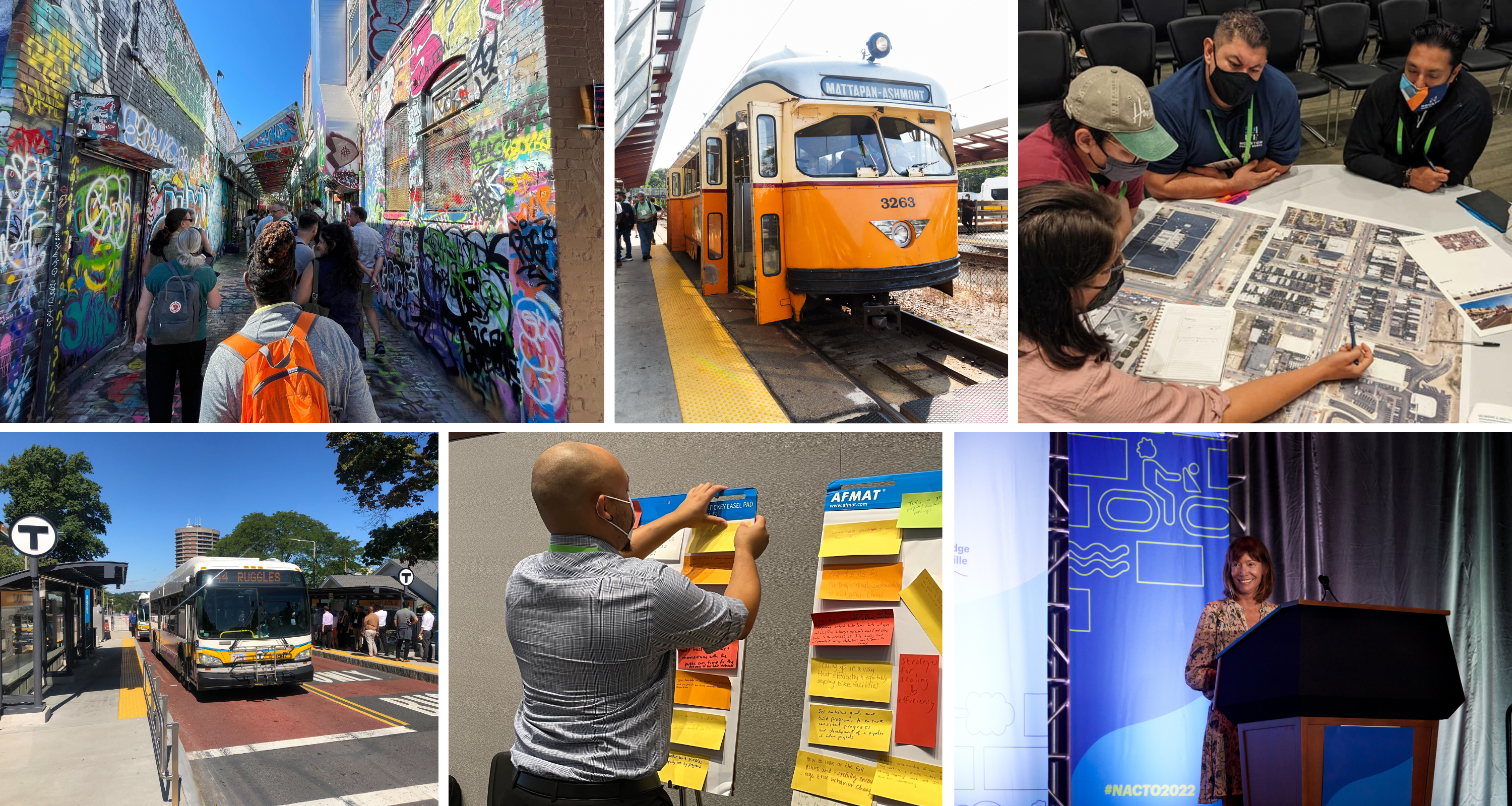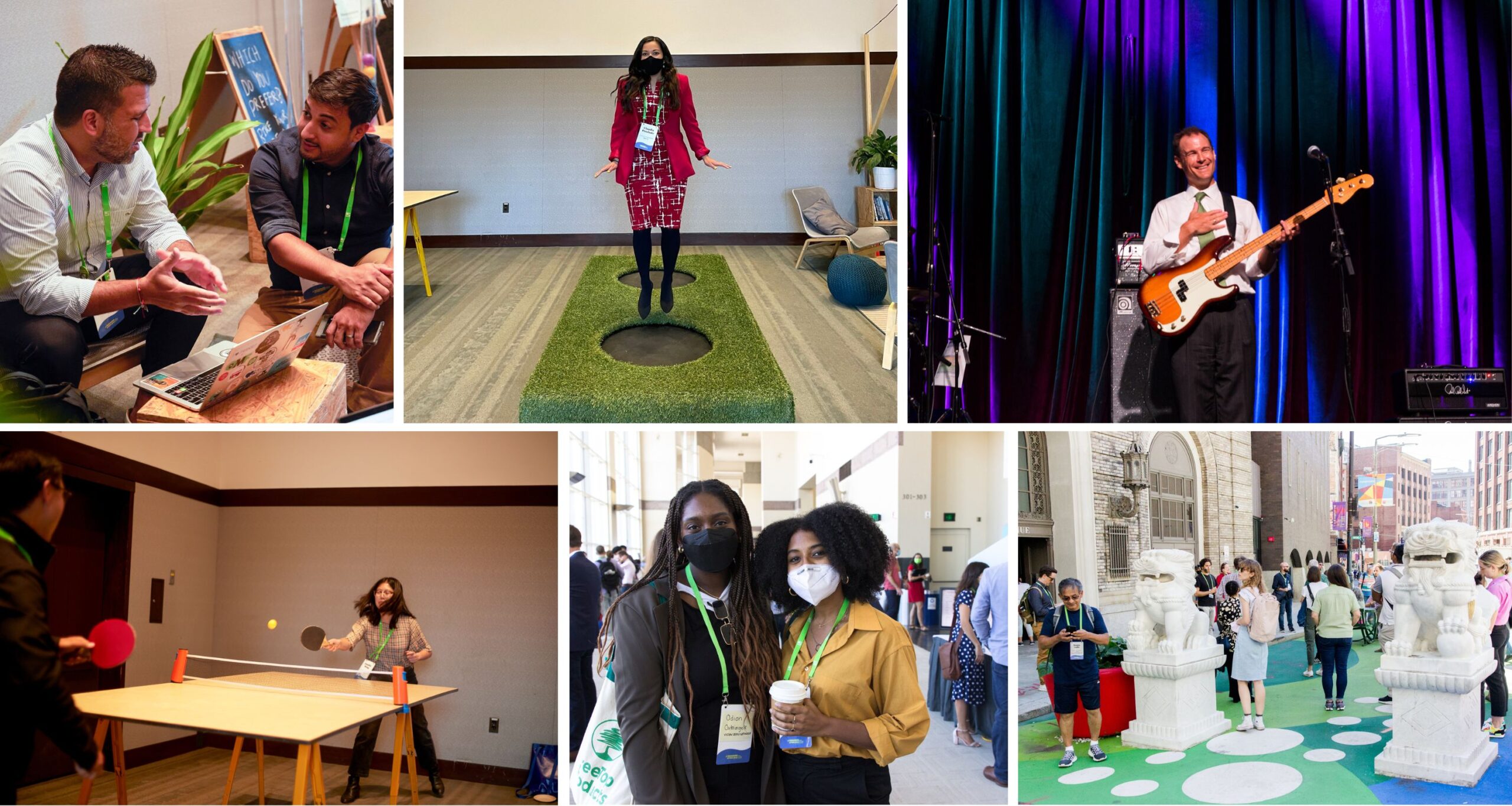Reflections on #NACTO2022: The Power of Coming Together and the Work that Lies Ahead
Oct 06, 2022

Images by Cidgy Bossuet and Kate Fillin-Yeh.
After Labor Day weekend, amidst the rush of back-to-school and an unprecedented transit crisis in our host cities, NACTO brought 1,200 transportation experts, policymakers, advocates, and practitioners to Boston, Cambridge, and Somerville for the return of our Designing Cities Conference. It was both the 10th anniversary of the conference, and our first one back in person since the beginning of the COVID-19 pandemic.
Practitioners from over 200 cities across North America gathered at the Hynes Convention Center to hear from 110 speakers in 37 breakout sessions and nine workshops. We walked, biked, rode – and kayaked – in 45 WalkShops across the region. And we drank countless* gallons of coffee to keep ourselves going through it all. (*To be precise, it was 103 gallons of coffee, according to our bill.)
Together, in the same room, we heard from some of the region’s and country’s highest-profile leaders: Mayors Michelle Wu, Sumbul Siddiqui, and Katjana Ballantyne of Boston, Cambridge, and Somerville, Congresswoman Ayanna Pressley, USDOT Deputy Director Polly Trottenberg, and FHWA Deputy Administrator Stephanie Pollack, who shared both their personal histories and their vision for the future of transportation policy. On dozens of WalkShops led by city staffers and local experts, we learned about–among many themes–the lasting social and economic impacts of the Big Dig project, the struggle for environmental justice in East Somerville, the process of reimagining shared space in Cambridge’s cultural district and the power of regional collaboration.
And when, just weeks before the conference, the MBTA announced unprecedented plans to shut down its Orange Line and Green Line train lines for emergency repairs, we got a first-hand look at how local governments jump into action to quickly transform streets to serve residents in new, crucial ways. Boston built miles of new bus lanes in a matter of weeks, and the Bluebikes bikeshare system set ridership records, proving its value as part of the public transportation system. Some of those changes will now be made permanent.
“In the face of this tremendous disruption, we’ve seen the signs of what a better future might look like,” Boston’s Chief of Streets, Jascha Franklin-Hodge told attendees at our opening plenary.
In many ways, that creativity and perseverance in the wake of unpredictability embodies the work our member cities have done these past few tumultuous years. Navigating the pandemic has taught us about adapting through disruption, about finding our north stars, about centering justice in everything we do. #NACTO2022 was an opportunity to honor and reflect on that work. It was also a chance to learn, to get re-energized, and to gear up to tackle the myriad challenges our cities still face: the traffic safety crisis, the climate crisis, an economy that increasingly leaves people behind, and the deep and enduring racial inequities in our communities.

Images by Cidgy Bossuet and Mike Mejia.
Above all else, the conference was a chance to come together in community after multiple years apart, and to share new ideas and experiences. The last two-and-a-half years have been defined by distance and physical isolation. Despite that, our community is growing: since we last gathered in Toronto in 2019, NACTO has welcomed twelve new agencies to our network. The years ahead will require us to continue to practice new ways of thinking, of working, of being. Our ability to adapt or make it through comes from each other–using the networks we have, to find solutions to problems we’ve yet to solve, or in many cases even faced before.
As Mayor Wu reminded us in her remarks: “At the end of the day, that is where our focus lies: On making transit less about the movement between people and spaces, and more about the connection between them.” Similarly, we hope that our conference can be a conduit for community and connection.
Like a multimodal transportation system, a gathering like #NACTO2022 isn’t created overnight. In many ways, this conference was over three years in the making. Cities were chosen, venues booked, and money was spent in 2019 to hold our spots for a Fall 2020 conference—only to be renegotiated a few months later for a hopeful return. As we began to prepare for 2022, we made a vow to ourselves and our community to plan a gathering as thoughtfully as we could, given all we’d seen and learned as a result of COVID-19.
NACTO made decisions early on to protect our most vulnerable community members by requiring vaccinations, boosters, and masks, and by offering rapid testing, outdoor programming, shorter sessions, grab-and-go food, and space to spread out. The NACTO team spent hours researching individually-boxed rapid tests and healthpass provider apps, purchasing colorful masks to make it #fashion, and designing pins to communicate social distancing comfort levels on lanyards.

Images by Cidgy Bossuet, Tirrea Billings, Cary Bearn and Billy Richling.
Of course, on top of all that came the work of curating the conference content itself. Our host cities and NACTO staff spent months preparing their WalkShops, coordinating logistics with venues, the transit agency, bike providers, and helmet providers. To assemble our list of conference speakers, our team made hundreds of phone calls, spent countless hours scouring Twitter, YouTube, and LinkedIn, and invited members to nominate the best and newest voices in our field. Admittedly, our team doesn’t know everyone (yet!), and there are always speakers we can’t get. But we did our best to ensure the speaker list at #NACTO2022 was a reflection of what NACTO values:
- New, emerging voices
- Experience on the ground
- Diversity of thought
- Humility (and sometimes a little hubris)
- Bold imagination
- A spirit for change
With those values in mind, our team brought in speakers from around the NACTO network (and beyond) to elevate interesting and timely civic stories. Activist and consultant Tamika Butler; Veronica Davis, Houston’s Director of Transportation & Drainage Operations; Kim Lucas, Director of Pittsburgh’s Department of Mobility and Infrastructure; Barkha Patel, Jersey City’s Director of Infrastructure; Najwa Doughman from the Global Designing Cities Initiative; Janette Sadik-Khan, Principal at Bloomberg Associates and NACTO’s Board Chair–each of these these speakers offered us unique perspectives, histories and lessons, and we were gratified to hear from the feedback we received that they were broadly our attendees’ favorites to hear from as well.
We also noticed some challenging trends in terms of who wasn’t able to make it. The burden of the pandemic continues to impact women and people of color’s ability to travel and network–we hope to work with the full NACTO community to understand the barriers, and what we can all do to make women and people of color equally likely to be able to say ‘yes’ to speaking on a panel, or to being at the conference at all.
Our network is strengthened by asking ourselves who is and isn’t at the table. What can we do to create a community of belonging? Nobody pushed us to question this more than our partners at Barr Foundation, resulting in a better conference for everyone, including a full-on popup living room–complete with a trampoline and ping pong table–for rest and spontaneous downtime. It allowed us to bring 100+ people representing the local region to the conference on full scholarships. And it allowed us to highlight new faces and new voices, as our network continues to push and encourage us to be even more intentional about the community we build in our spaces.

Images by Cidgy Bossuet.
It takes a significant amount of time, energy, and intentionality to create a conference that is inclusive, empowering, thought-provoking, and energizing. We will never get it 100% right. But NACTO’s goal is to welcome you into this community as your true, authentic self – to actively engage, participate, share, and learn so you return home with new tools and ideas to bring impactful, positive change to your cities.
We know there are still systemic inequities we most collectively battle and address to keep moving forward in these goals. This community doesn’t just automatically create inclusive, belonging spaces. We each need to work to achieve that by respecting, engaging, and supporting one another. You can help us in that work by uplifting the voices of those already embodying these values and nominating people you admire as speakers. The diversity of thought comes from our ability to ask a diversity of people to join us – we can’t do that alone.
NACTO extends a special thank you to our partners in Boston, Cambridge, Somerville, and elsewhere—especially Sarah Anders, Silvia Castanos, Brad Rawson, Joe Barr, Jascha Franklin-Hodge, Elise Harmon-Freeman, Viola Augustin, Brooke McKenna, Andy Reker, Stefanie Seskin, Kim Foltz, Lynsey Heffernan, Kelly Chronley, and Najah Casimir—for playing such crucial roles in the lead up to #NACTO2022. We’re also grateful to our own staff–especially our Events and Engagement team–for the enormous effort it took to pull this event together.
And we’re especially grateful to each of you who made it to the conference to connect with us in person. At the end of our closing plenary, we asked all attendees to fill out notecards highlighting one goal, commitment or inspirational idea they’d like to bottle up for their future selves. We can’t wait to see you in Denver in May 2023 (yes, a spring conference!) where we’ll hold each other accountable for those commitments, and celebrate how far we’ve come.
We gather to problem-solve, to connect, to uplift, and to challenge the status quo amongst this community of forward-thinking transportation leaders. We know the work ahead will not be easy. Our transportation system continues to exacerbate our climate, equity, and safety crises. But #NACTO2022 reminded us that with determination, grit, creativity–and community–we can accomplish incredible things, make progress, build momentum for further change, and serve our communities. We’re excited to celebrate our progress, and recommit to the work ahead.
